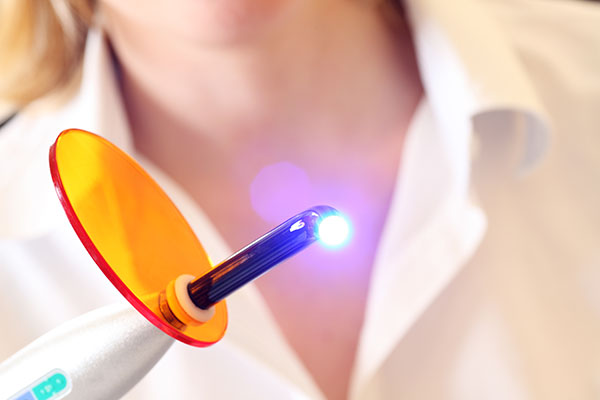Benefits of Seeing a Laser Dentist

Laser dentistry is a new way of enhancing traditional dental treatment. It has the potential to improve the success rates of dental procedures by improving the dentist’s ability to control the power output and duration of exposure on a particular tissue or oral structure. This allows dental treatments to be much more specific and focused, while also lessening the chances of causing damage to any surrounding tissues. There are plenty of benefits that come with seeing a laser dentist. However, as with all technology, it is also important to understand just how laser dentistry works before jumping into the dentist chair. Read on to learn more.
Less dental anxiety
One of the greatest benefits of laser work is the removal of the big dental drill. Whether it was from a traumatic childhood memory or a hidden internal fear, dental anxiety is a real issue. However, seeing a dentist regularly is crucial to maintaining oral hygiene and tooth health. Laser dentists remove this issue by erasing all the big scary sounds that come with a metal drill. In addition, certain laser procedures do not require the use of anesthesia at all. This means less bleeding due to promoted blood clotting, and lesser probabilities of collateral damage to the surrounding tissue.
Benefits of lasers
There are generally two types of lasers being used - one for hard tissue work, and one for soft tissue work. Both were made specifically to cut into a certain type of tissue, leading to less bleeding and heal time. The lasers use different wavelengths on different materials. Hard tissue lasers are primarily used for teeth but can also cut through bone. Soft tissue lasers are lightweight and are used to seal blood vessels. These soft tissue lasers help to reduce the blood lost during the procedure as they absorb hemoglobin and water with ease.
Healing processes
Since patients are avoiding all the aches and pains that come with a traditional dental drill, they will have the ability to heal faster. A laser beam is much more precise and easier to regulate than a big drill. Wounds tend to heal much quicker and the laser actually promotes tissue regeneration. A laser dentist can also fix soft tissue issues during procedures. This can include crown lengthening, removing soft tissue folds, and treating additional muscle attachment and tooth sensitivity. Due to the overall efficiency and ease of laser dentistry, patients are gravitating toward the new technology more and more each year.
Education and treatment benefits
A laser dentist will have additional training as well as the typical dental certificates. Laser dentistry is still considered new technology - this means training must be involved. A laser specialist will have both the certifications and experience to treat all sorts of dental issues with both a traditional drill and laser work. It is important to note that laser dentistry is considered a less invasive technique which helps to reduce discomfort. The end results are also much more beneficial. Patients are less likely to require any sort of sutures or additional anesthesia. In addition, the laser will help sterilize the gum during the procedure; this means less chance of infection or damage to the gums. This correlates to less aftercare and healing time needed after the procedure.
Learn more from a laser dentist
Laser dentistry is still considered new technology; we are still learning about this innovative technique every day. However, there are many benefits that have already been linked to laser work. If you are dealing with dental anxiety or have a low pain tolerance, laser dentistry may be a great match for you.
Request an appointment here: https://dragonflydentalportcharlotte.com or call Dragonfly Dental of Port Charlotte at (941) 676-9225 for an appointment in our Port Charlotte office.
Check out what others are saying about our dental services on Google: Laser Dentistry.
Related Posts
Cosmetic dentists take pride in enhancing the appearance of their patients' smiles. Since everyone has different treatment goals, finding the right dentist can take some time and research. Asking yourself a few simple questions can help you figure out what you need in a cosmetic dentist, streamlining your search.While all general dentists complete training to…
Aging affects every part of the body, including the look and health of the teeth. A cosmetic dentist can address the common dental challenges that come with aging teeth and gums. As people get older, their teeth may become discolored, worn, chipped, or misaligned. Gums can recede, become sensitive, or show signs of disease. Cosmetic…
A cosmetic dentist specializes in enhancing the appearance of the teeth, gums, and smile through various treatments designed to improve both function and aesthetics. While general dentists provide essential care to maintain oral health, a cosmetic dentist focuses on cosmetic procedures that can transform the look of your smile. Visiting this professional offers several key…
A cosmetic dentist can be any dentist who helps improve the look of the smile through treatments like whitening, veneers, and clear aligners. Many patients want to know whether they should see a cosmetic dentist or an orthodontist when planning to straighten their teeth. The answer depends on the type of dental issue and the…
